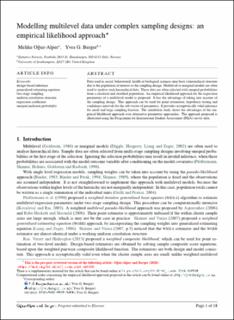| dc.contributor.author | Oguz-Alper, Melike | |
| dc.contributor.author | Berger, Yves G. | |
| dc.date.accessioned | 2022-03-29T14:40:45Z | |
| dc.date.available | 2022-03-29T14:40:45Z | |
| dc.date.created | 2020-04-29T16:38:33Z | |
| dc.date.issued | 2020 | |
| dc.identifier.citation | Computational Statistics & Data Analysis. 2020, 145 (May), . | en_US |
| dc.identifier.issn | 0167-9473 | |
| dc.identifier.uri | https://hdl.handle.net/11250/2988425 | |
| dc.description.abstract | Data used in social, behavioural, health or biological sciences may have a hierarchical structure due to the population of interest or the sampling design. Multilevel or marginal models are often used to analyse such hierarchical data. These data are often selected with unequal probabilities from a clustered and stratified population. An empirical likelihood approach for the regression parameters of a multilevel model is proposed. It has the advantage of taking into account of the sampling design. This approach can be used for point estimation, hypothesis testing and confidence intervals for the sub-vector of parameters. It provides asymptotically valid inference for small and large sampling fractions. The simulation study shows the advantages of the empirical likelihood approach over alternative parametric approaches. The approach proposed is illustrated using the Programme for International Student Assessment (PISA) survey data | en_US |
| dc.language.iso | eng | en_US |
| dc.title | Modelling multilevel data under complex sampling designs: An empirical likelihood approach | en_US |
| dc.type | Peer reviewed | en_US |
| dc.type | Journal article | en_US |
| dc.description.version | submittedVersion | en_US |
| dc.rights.holder | Elsevier | en_US |
| dc.source.pagenumber | 16 | en_US |
| dc.source.volume | 145 | en_US |
| dc.source.journal | Computational Statistics & Data Analysis | en_US |
| dc.source.issue | May | en_US |
| dc.identifier.doi | 10.1016/j.csda.2019.106906 | |
| dc.identifier.cristin | 1808703 | |
| cristin.ispublished | true | |
| cristin.fulltext | preprint | |
| cristin.qualitycode | 1 | |
